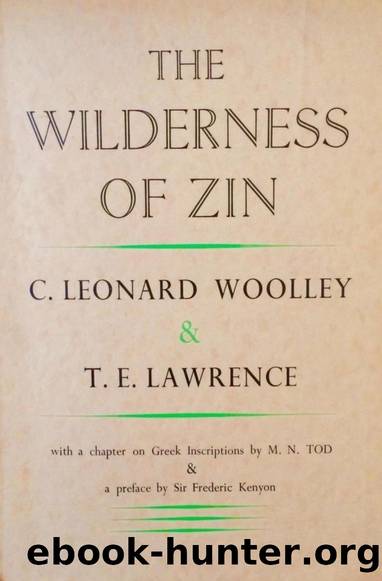The Wilderness of Zin by C. Leonard Woolley

Author:C. Leonard Woolley [Woolley, C. Leonard]
Language: eng
Format: epub
ISBN: 9781900988292
Google: DeYUAQAAIAAJ
Published: 2017-03-23T10:46:52+00:00
AIN KADElS AND KOSSAlMA.
and the Latin Mohaila, the military station in the Notit£a.
In Christian
times, he says, it must have been the seat of an archbishopric, since Palmer found there traces of Christian occupation. His first point is etymology, in which we are incompetent ; in regard to his second there are no material classical remains to make probable a Roman post.
As for the Christian
remains, Palmer, whom he quotes, in describing them, is carefully exact upon the two insignificant and widely separated holes in the chalk which still exist, each with a little cross in red painted on the wall.â*â All Sinai, Palestine, and Syria are littered with similar remains.
And there is no reason why
these particular caves should have ever contained an archbishop. There was probably another Muweilleh below Aila on the road to Sinai. I t is, unfortunately, a very common Arab place-name.
v.
Kadesh-Bantea.
It would perhaps be improper to close this chapter without any reference to the vexed question of Kadesh- Barn ea. The unfortunate vagueness of the Pentateuch geographically, and its lack of synthesis historically, cause the end of all such contrpversies to be a deeper confusion than the beginning : therefore, so far as possible, we have kept out of our pages any reference to the barren literature of to·day which wrangles over indeterminable Bible sites.
1n most cases the strife is about a Hebrew name, and its possible reappearance in a modern Arab form. That glib catchword The unchanging East â
1â
has blinded writers to the continual ebb and Row of the inhabitants of the desert. It is hopeless to look for an Arab tribe which has held its present d£ra for more than a very few generations : and to expect continuity of name, as in settled districts in Syria, is vanity. A second factor to be remembered is that the Jews were an unscientific people, anxious only to get through the inhospitable desert as soon as might be. Research into local nomenclature is to-day very difficult among the tribesmen ; and it is not likely that Moses was more patient and painstaking than a modern surveyor.
Probably, as often as not, the Israelites named for themselves their own camps, or unconsciously confol;lnded a native name in their carelessness.
* Phe Jaussen, in the Revue B£bl
iqr�e for July, tgo6, bas drawn plans of these caves.
Download
This site does not store any files on its server. We only index and link to content provided by other sites. Please contact the content providers to delete copyright contents if any and email us, we'll remove relevant links or contents immediately.
| Anthropology | Archaeology |
| Philosophy | Politics & Government |
| Social Sciences | Sociology |
| Women's Studies |
Mysteries by Colin Wilson(3454)
People of the Earth: An Introduction to World Prehistory by Dr. Brian Fagan & Nadia Durrani(2736)
Ancient Worlds by Michael Scott(2688)
The Splendid and the Vile by Erik Larson(2472)
Foreign Devils on the Silk Road: The Search for the Lost Treasures of Central Asia by Peter Hopkirk(2464)
The Memory Code by Lynne Kelly(2401)
Come, Tell Me How You Live by Mallowan Agatha Christie(2260)
The Earth Chronicles Handbook by Zecharia Sitchin(2229)
Lost Technologies of Ancient Egypt by Christopher Dunn(2225)
The Plantagenets by Dan Jones(2090)
Last Chance to See by Douglas Adams(1990)
The Return of the Gods by Erich von Daniken(1945)
Wars of the Anunnaki by Chris H. Hardy(1715)
Keeper of Genesis by Graham Hancock(1648)
Before the Dawn by Nicholas Wade(1606)
The Cygnus Mystery by Andrew Collins(1559)
The Message of the Sphinx by Graham Hancock(1513)
Fragile Lives by Stephen Westaby(1455)
A History of the World in 100 Objects by MacGregor Neil(1370)
